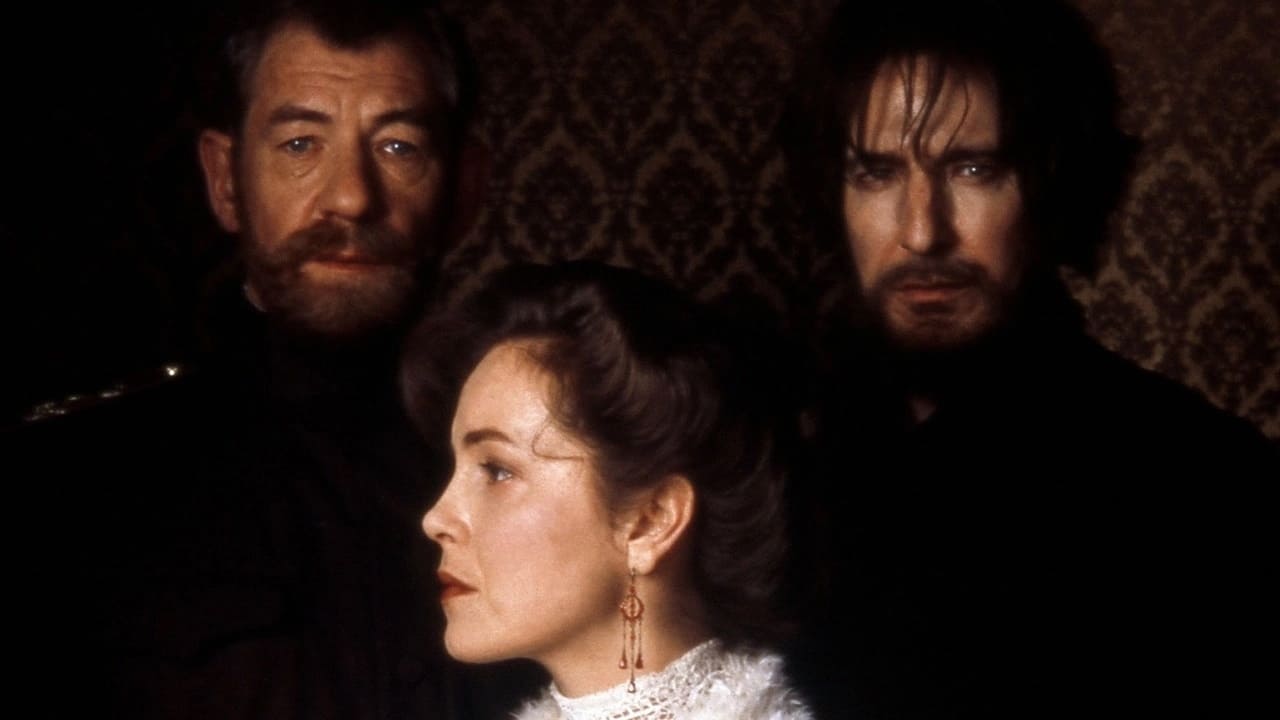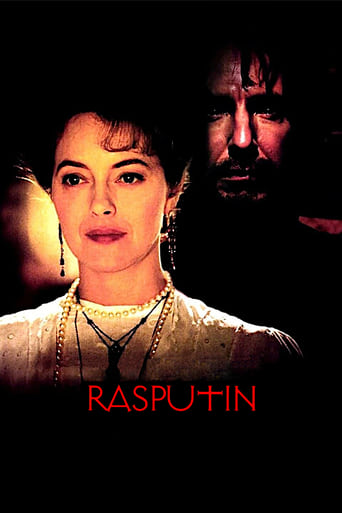

Grigori Rasputin – infamous Russian holy man and historical enigma – has had his tale told in film many times, though too often through the lens of grotesque embellishment. While HBO's 1996 production is not a perfect film and had no hope of accurately framing the man's life in 135 minutes, it is one of the most sober-minded of biographies on Rasputin and reigns as one of the best all-around features of its infamous subject. Though the film deals alternatively pleasing and disappointing plot features in a tit-for-tat manner, it boasts great production values and excellent casting, making for a very satisfying experience that I am surprised never saw a theatrical release.The story: Driven by a sense of destiny, a Siberian peasant with apparent supernatural talents (Alan Rickman) works his way into the Russian royal family and influences the downfall of an empire.Alan Rickman *is* Rasputin. Lionel Barrymore and Christopher Lee have nothing on Rickman, who channels Rasputin's extremes with grace and nuance suggesting a genuine understanding of the character. Admittedly, Rickman's most memorable scenes include a lot of caterwauling and grandiose dialogue, but look no further than the quieter scenes to see the sincere and insecure side of Rasputin come to life. Rickman even replicates the curious manner of speech reported of the character, demonstrating an attention to historical detail prevalent throughout the film (more on that soon). As good as Rickman is, he's matched by Ian McKellan who is perfect for the regal role of Tsar Nicholas II. Greta Scacchi as Tsarina Alexandra and young Freddie Findlay as Tsarevich Alexei are likewise strong, but are at the disadvantage of slightly weaker roles.Nevertheless, I appreciate that the film focuses so much on Alexei, who is the lynchpin of the Rasputin tale but tends to be only fleetingly analyzed in both movies and history books. This film is anchored on the relationship Rasputin had with Alexei and Alexandra, and the result is a pleasantly emotional character dynamic. It's even easier to invest in thanks to the realistic detail. I am not sure whether the movie was actually filmed in and around the actual Winter Palace, but the sets are convincingly beautiful. And though the movie takes some historical liberties, the abundance of accurate details suggest that the filmmakers did indeed do their homework: the inclusion of often-overlooked figures such as Bishop Hermogen and Derevenko the sailor-nanny is one thing, but the filmmakers go out of their way to highlight tidbits such as the fact that Nicholas II abdicated on a train and that Rasputin played with the cabinet in Prince Yusupov's basement before he was assassinated. I'm impressed.I am a little less impressed with the foreground of the movie. I don't mind that not every facet of the real story is depicted (I still hope for a miniseries to attempt this), but I wish that the film's take was not quite so one-sided and ambiguous. The movie makes hardly any mention of Rasputin's colossal influence on matters of state, choosing instead to explain the public hatred of him by his sexual scandals. And while it was about time that Alexandra was judged favorably by any medium, it's disappointing that there's no hint of the alienating behavior that her adoration for Rasputin invoked. If anything, the movie is *too* friendly to Rasputin and the Romanovs, depicting the former as a horny weirdo and the latter as gullible victims. The picture is what it is, but I'm certain it would have been more interesting if its subjects had been a little less pristine.Nevertheless, as aforementioned, I am convinced that this is the best Rasputin biography produced to date. Time will tell whether the upcoming Leonardo DiCaprio production or others dethrone it, but for those who are tired of the overdone horror films based on the story, this VHS tape is worth tracking down for now.
... View MoreRASPUTIN, a TV movie from 1996, features a barnstorming performance from Alan Rickman, playing the "mad monk" who inveigles his way into the Russian royal family when he heals their son from sickness. Really, of all the actors in the 1990s, Rickman was the perfect choice for the role: he can do crazy like nobody else, and he dominates the screen every time he appears. Unlike the Hammer film RASPUTIN, THE MAD MONK, Rasputin is no straight villain here, and the filmmakers imply that he did have some kind of supernatural ability.I'm glad Rickman's on board, because without him, RASPUTIN wouldn't have been much at all. As a TV movie it's a very simple, standardised retelling of the material, big on costumes and backdrops but one which reveals very little about the political situation of the era. Still, at least the cast has been populated by decent actors, including Greta Scacchi, Ian McKellen, David Warner, James Frain and the like; but inevitably it's Rickman you remember here, all wild hair and beard, stripping on a table and outraging members of Russia's polite society.
... View MoreGrigory Yefimovich Rasputin was a controversial figure, but there can be no doubt that he was also a remarkable one, even if one also regards him as a charlatan. For an uneducated peasant to have risen to be the close friend and confidant of one of the world's most powerful monarchs is no mean achievement. What, however, caused him to live in the popular imagination was his own bloody murder in 1916, followed by that of the Imperial Family two years later in the wake of the Russian Revolution. Had there been no Revolution, Rasputin would today be a minor figure, forgotten by all except specialists in the history of early twentieth century Russia.It is hardly surprising that there have been a number of films about him, the first- presumably an anti-Russian propaganda film- being made in Germany only a year after his death. "Rasputin and the Empress" from 1932 is remembered today less by film buffs than by it is lawyers, as it gave rise to a lawsuit which led to one of the leading cases in English libel law. Hammer's famously inaccurate "Rasputin the Mad Monk" from 1966 is essentially a horror film dressed up as a historical drama. (The inaccuracy starts with the title; Rasputin, a self-proclaimed "holy man", was never a monk). He appears in "Nicholas and Alexandra" from 1971, but only in a supporting role; as its title suggests that film deals primarily with the doomed Imperial couple.This film is probably the best filmed version of his life that I have seen, despite one or two historical inaccuracies. The main reason is the fine performance by Alan Rickman in the title role. The historical Rasputin seems to have had great charisma and a certain spirituality; his claim to possess abilities as a faith healer may have been genuine. Combined with these qualities, however, were his notorious moral weaknesses; he was both a drunkard and a womaniser. (His enemies seized gleefully on the similarity between his surname and the Russian adjective "rasputniy", meaning "debauched"). His influence over the Tsar was not always a beneficent one, although it is noteworthy that he opposed the fateful decision- to go to war with Germany in 1914- which was eventually to lead to the downfall of the Romanovs. Rickman, often good when portraying morally ambiguous figures like Severus Snape in the "Harry Potter" films, brings out all these contradictory sides of his character, giving us a portrait of a strange, driven individual, both mystic and fanatic, holy man and sinner.Ian McKellen, whose portrayal owes something to Michael Jayston's in "Nicholas and Alexandra" is good as the Tsar, a hesitant, nervous autocrat, a kindly family man but despotic ruler. I did not, however, care for Greta Scacchi as Alexandra. (I much preferred Janet Suzman). Scacchi, previously better known for playing sexually provocative temptresses in films like "Heat and Dust", "White Mischief" and "Presumed Innocent", never seems either sufficiently regal or sufficiently commanding. Alexandra was the dominant partner in her marriage, and the influence of this German-born woman over the Tsar was resented by many Russians, especially after 1914). At least Scacchi gets to keep her clothes on in this film; it is a popularly held, although inaccurate, belief that Rasputin was (in the words of Boney M) "lover of the Russian Queen", but this canard is not repeated in the film.As a whole, the film is not quite as good as "Nicholas and Alexandra", lacking the earlier film's epic grandeur and visual splendour. It never, however, sets out to be a major epic of that sort, having been made for television rather than the cinema screen. As a made-for-TV historical drama it is very watchable. 7/10
... View MoreAllen Rickman decided to become Rasputin. He did a lot of research, introspection and study. I fear for his soul. Historically as accurate as it could be, there are flights from and to events which are poetic license. Rasputin was an original, not a Barnum, nor a John the Baptist. The time in Russia from 1907 to 1917 was a catastrophe of Greek proportions. Masses were shot, murdered. The White Russians rebelled against the Communists and they had a war which rivalled the brutality of the Great War. Finally Lenin died and Stalin took over for thirty years of murder, failed five year plans, and total war against the Germans. Was Czarism really that bad?
... View More